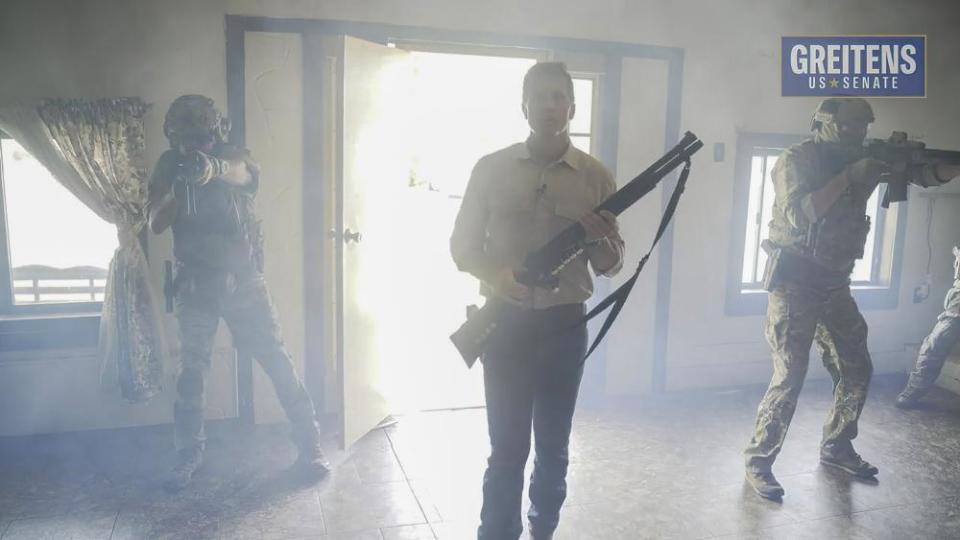Incendiary Republican ads boasting of ‘hunting’ rivals raise fears of violence

Before the Capitol attack on 6 January, Robert Pape, a University of Chicago professor, had studied political violence around the world but not in the United States because there had not been much to examine, he said.
Pape worries that could soon change because of politicians like Eric Greitens, a former Navy Seal from Missouri running for Senate, who recently released an advertisement in which he racked a shotgun and led a team of armed men as they stormed a house to hunt more moderate members of his own party, know derisively as Rinos, as in “Republicans in name only”.
“Join the Maga crew,” Greitens, a former Republican governor, declares in the ad. “Get a Rino hunting permit. There’s no bagging limit, no tagging limit, and it doesn’t expire until we save our country.”

But such messaging won’t save lives and instead could lead people to rationalize committing violence against those with whom they have political disagreements, according to Pape and other political scientists.
“This is important, not because [Greitens] himself will necessarily do any violent act, but what is happening is that the more there is community support for violence, this lowers the threshold for volatile actors to act violently,” said Pape, who directs the Chicago Project on Security and Threats.
Public figures on the left – and a smattering on the right – condemned the ad, and Facebook removed the video for violating its violence and incitement policies.
This is not the first time that Greitens has released such a campaign video. In April, he posted one on Twitter in which he and Donald Trump Jr, fired rifles at a range. In the accompanying text he wrote, “Striking fear into the hearts of liberals, Rinos, and the fake media.”
Greitens leads the Republican primary for Senate, according to recent polls, in spite of allegations that he committed campaign violations and was abusive to his wife, who has since divorced him, their children and a woman with whom he had an affair.
Nor is he alone among Republicans in producing incendiary advertisements featuring guns. More than 100 television ads this year from the party’s candidates and supportive groups have included guns as talking points or visual motifs, according to the New York Times.
In the Republican Senate primary in Pennsylvania, Dave McCormick, who later narrowly lost, ran an ad in which he recalled his experiences with various guns and said, “I approve this message to protect the second amendment because that’s what guarantees the rest of it.”
But Greitens’ spot differs from other Republican candidates’ videos in that it shows him and the other men targeting political opponents rather than, for example, shooting an inanimate object, the political scientists said.
“What I do not recall seeing before is actually verbalizing that the target is other people,” said Erika Franklin Fowler, a professor of government at Wesleyan University, and an author of a report on guns in recent political advertising.
The video also differed from other incendiary advertisements in that Greitens says people in his own party should be targeted.
“Republicans are competing against each other for the nomination there, so it’s not unusual to hear within-party criticism, but I’ve never heard such vitriol against their own party from a candidate, let alone in an ad that was presumably vetted by several people in the campaign,” Nathan Kalmoe, professor of political communication at Louisiana State University and author of Radical American Partisanship, stated in an email.
The political scientists also expressed concern over the video because he is among the Republican candidates who promote the false conspiracy theory that the 2020 election was rigged against Donald Trump.
“It’s of extreme concern to me that fairly mainstream Republicans have jumped on that wagon in order to win in primaries,” said David Romano, a Missouri State University professor who researches and teaches about political violence. “If [Republicans] think it’s rigged again in the next presidential election, then it’s not a far step to much more widespread violence, like we saw on January 6.”
Pape, who has studied conflicts in the Middle East and eastern Europe, worries that such messaging could lead to similar violence in the United States. He traced his concern to events such as the May mass shooting in Buffalo. The alleged perpetrator targeted Black people and cited the “great replacement” conspiracy theory that non-white individuals are being brought to America to replace white voters and achieve an agenda.
“There is every reason to believe our country will follow the trajectory of other countries and societies where this kind of rhetoric is in the mainstream,” said Pape.
Pape has called for a “public conversation about the consequences of community support for violence in the mainstream”.
He testified at a Senate judiciary committee earlier this month on the “metastasizing” domestic terrorism threat. Pape said he saw it as a positive step that a bipartisan group of senators held such a hearing and “were not at each other’s throats”.
“They didn’t fully agree by any stretch,” Pape said. “There are differences, but they were trying to think through these issues of political violence in the mainstream, and it’s a challenge because this is not a problem that’s been around for 30 years.”

 money
money 